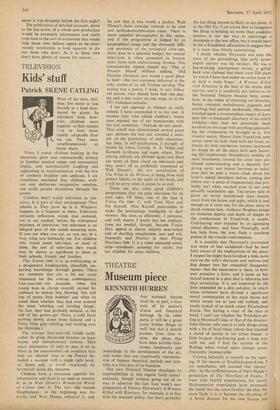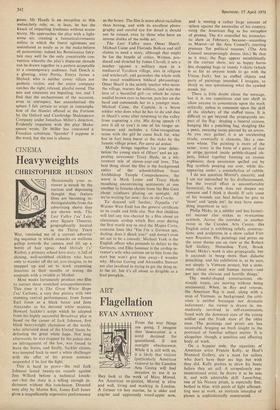THEATRE
Museum piece
KENNETH HURREN
Our own National Theatre shoulders its responsibilities in this regard fairly consci- entiously, though without going out of its way to advertise the fact. Last week's new production of Thomas Heywood's A Woman Killed with Kindness, for example, is in line with the museum policy, but that's probably
the last thing anyone is likely to say about it at the Old Vic. I am aware that to categorise the thing as holding no more than academic interest is not the• way to encourage a stampede to the box office, but it would seem to me a fraudulent affectation to suggest that it is more than fitfully entertaining.
I doubt whether Heywood was ever the toast of the groundlings (the early seven- teenth century was his heyday). He was a fast-working, journeyman writer, a gifted hack who claimed that there were 220 plays 'in which I have had either an entire hand or at least a main finger.' A Woman Killed with Kindness is the best of his works that survive, and it is justifiably put before us by the National Theatre because here, some- how, in the midst of churning out histories, farces, romantic melodramas, pageants and anything that seemed marketable, Heywood touched upon a commonplace aspect of dom- estic life—a husband's discovery of his wife's infidelity—that had not previously been handled on the stage with anything approach- ing the compassion he brought to it. The country squire, Master John Frankford, who comes upon his lady abed with her lover, re- strains his first murderous instinct (nurtured no doubt by all the plays he'd seen featur- ing the impetuously bloodthirsty nobility in such situations); instead he cools into dis- tressed understanding and a decently for- giving spirit, and indeed becomes so solici- tous that he puts a warm cloak about the lover's naked shoulders before turning the fellow out—a point of magnanimity that pro- bably isn't often reached even in our own sexually nonchalant age. The errant wife is given no worse punishment than banish- ment from his house and sight, which is bad enough as it turns out, for she pines away to death without him. Anthony Hopkins brings an immense dignity and depth of insight to the predicament of Frankford, a simple, God-fearing man impaled by an agonising moral dilemma; and Joan Plowright, with less help from the text, finds a touching pathos in the crucial confrontation.
It is possible that Heywood's innovation was more or less accidental—had he been fully aware of the implications of the piece, I suspect he might have lavished a little more care OR the wife's character and motives and dug deeper into her connubial disappoint- ments—but the innovation is there, in how- ever primitive a form, and it lends an his- torical interest to a play that is otherwise less than stimulating. It is not improved by the time expended on a dire sub-plot, in which some reviewers have divined a significant moral counterpoint to the main theme but which struck me as rare old rubbish, ted- iously typical of so much minor Elizabethan drama. Not having a copy of the play at hand. I can't say whether the Yorkshire set- ting is Heywood's idea or that of the director, John Dexter, who uses it to jolly things along with a lot of local rustic colour that touched a chord of apathy in my urban breast: a little by-gum clog-dancing goes a long way with me, and T find the accents of the Ridings when visited upon antique prose, frequently impenetrable.
Coming belatedly to remark on the open- ing of the season at Stratford-upon-Avon. am nonetheless still stunned—but nleasur- ably—by the inoffensiveness of Terry Hands's production of The Merchant of Venice. went with fearful expectations, for recent Shakespearian experiences have promoted the belief that the more familiar the play the more likely it is to become the plaything of a bored director for his own bizarre put.- poses. Mr Hands is an exception to this melancholy rule; or, at least, he has the knack of imparting freshness without eccen- tricity. He approaches the play with a light- some air, creating a fantastical-romantic milieu in which the literal uglinesses are assimilated as easily as in the make-believe of pantomime; indeed his Renaissance fairy- tale may well be the only conceivable con- vention whereby the play's disparate threads can be drawn together in a pattern acceptable to a contemporary audience. Judi Dench is a glowing, witty Portia, Emrys James a Shylock who is neither comic villain nor pathetic victim, and the entire company catches the right, relaxed, playful mood. The sets and costumes are beguiling, too, and I find that the enchantment of the occasion, even in retrospect, has anaesthetised the spleen I felt certain to erupt in contempla- tion of the Hamlet offered at the Fortune by the Oxford and Cambridge Shakespeare Company under Jonathan Miller's direction. Evidently impatient with the play Shake- speare wrote, Dr Miller has concocted a Freudian substitute. 'Spamlet' I suppose is the word, but the rest is silence.







































 Previous page
Previous page